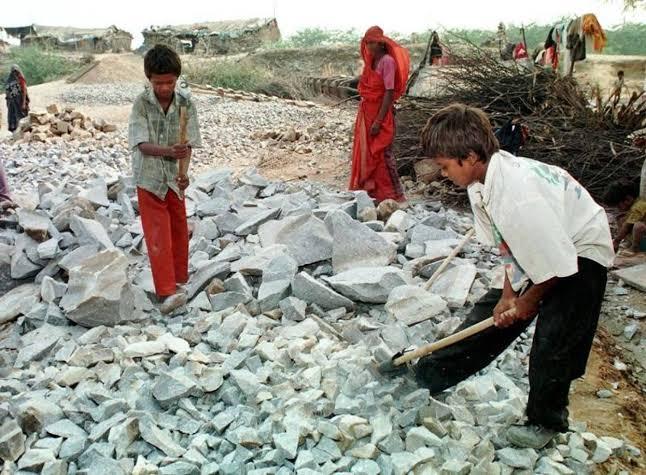NIRDPR Study Reveals Grim Reality of Migrant Workers at Stone Quarries

Poor living conditions and dangerous working conditions, labourers as young as 15 years old working from six in the morning till late evening, and majority with no political voice – this is the grim reality of a migrant worker in the stone quarries of Tamil Nadu and Uttar Pradesh, a study has revealed.
The study, conducted by the National Institute of Rural Development and Panchayati Raj (NIRDPR), discloses the hidden aspects of the lives of stone quarry workers—mostly inter-state migrant workers—in the two states. The findings are disturbing and presents a worrisome picture of a migrant worker who is away from his homeland, “pushed to the periphery of society.”
Foremost among these worries is the growing numbers of workers who are migrating to other places in search of a better livelihood. According to the 2011 Census data on migration released recently, 28.3% of the Indian workforce are migrants. Labour is circulated far and wide, and construction sector has emerged to be the largest employer with 40 million migrant workers.
Also read: Migrants in Gurugram: Economically Broke and Politically Powerless
Failure of agriculture and small scale and cottage industries result in unemployment and under-employment which lead to large quantity of labour migrating to different parts of the country, the study noted.
Stone quarries in Tamil Nadu and Uttar Pradesh employ a large number of migrant labourers. The study gives an explanation for this, as compared to local workers, migrants are more obedient, willing to work longer hours and have fewer social or family commitments.
The study found that most of the quarries were privately owned and no safety standards were followed. “Children were seen working with their bare hands with hammers and sieves,” said the study.
Most of the workers engaged in stone quarry work are from backward castes, accounting for 77.3% in Tamil Nadu, according to the study.
“The labourers were politically, socially and economically marginalised,” said R Chinnadurai, co-author of the paper and associate professor in NIRDPR’s Centre for Decentralised Planning, adding, “absence of any identity and legal registration with the local authority also meant that they have been kept out of the purview of the state machinery’s regulations. In our trip, we didn’t come across a single union which is obvious, as no formal employment contract is in place for the workers.”
The study also presents the poor implementation of the various provisions of the Interstate Migrant Workmen Act 1979, which regulates the condition of services of inter-state labourers. According to the law, the inter-state migrants are entitled to equal wages, displacement allowance, as well as confers power to the state and the central government.
However, as Chinnadurai told NewsClick, the provisions remain only on paper, while the exploitation continues on the ground. Incidentally, Interstate Migrant Workmen Act is one of the acts to be subsumed in the Modi government's codification process of the Indian labour laws. The act is one of the 13 labour laws related to the working conditions that is going to repealed by the Occupational Safety, Health and Working Conditions Code, 2019.
Also read: More Than Half of Construction Workers in Surat Are Homeless
The code was introduced in Parliament earlier this year on July 23, 2019, but, was never presented for debate. On October 9, the code was referred to a Parliament Standing Committee.
“I am not sure how codification will serve the purpose,” said Chinnadurai. According to him, when an act—which was enacted for a specific purpose—failed in regulating the exploitation of the migrant worker, then any amalgamation of it with other 13 central laws won’t make much of a difference.
“The laws are central, yet their implementation lies with the states,” he said, and added, “while the two states [Tamil Nadu and Uttar Pradesh] have failed in providing better livelihood to lakhs of migrants, it is yet to be seen how codification will play out.”
Get the latest reports & analysis with people's perspective on Protests, movements & deep analytical videos, discussions of the current affairs in your Telegram app. Subscribe to NewsClick's Telegram channel & get Real-Time updates on stories, as they get published on our website.
























